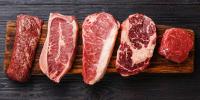
While there are some visible signs of ageing that occur in older dogs, there are also changes occurring internally. As your dog reaches the senior stage of their life, their bodies and digestion start to change and their immune system may need some extra support. To give the best to your furry friend, you may want to consider switching them to a dog food for senior dogs. Read on for some advice on when to feed senior dog food and to find out what makes senior dog food different from adult dog food.
When to Feed Senior Dog Food
Because ageing is different for every dog, it can be difficult to tell when to feed senior dog food. However, dogs typically experience some internal changes around the age of seven, even if they’re not showing any external signs of ageing. Around this time, your dog’s energy level may start to decrease and their metabolism may begin to decrease. Additionally, your dog’s brain may also become less efficient at metabolizing glucose, which can lead to memory problems. Around the age of seven, you may want to think about switching them to a dog food for senior dogs.
What Makes Senior Dog Food Different
You may be wondering what makes senior dog food different from adult dog food. The fact is, most senior dog food formulas contain lower calorie levels and a careful balance of other nutrients, such as essential fatty acids and antioxidants, to support your dog’s ageing joints and immune system.
Below is a list of some ingredients that make senior dog food different. Consider the items in this list when choosing a food for your senior pet.
- Lower levels of fat and higher levels of protein. It’s important to pay attention to your dog’s weight as he gets older. A few extra pounds can have a serious effect on your dog’s joints and cardiovascular system. Unless your dog is highly active, you should look for a senior dog food with slightly decreased fat and increased protein as compared to regular adult food. This will help your dog maintain lean muscle mass and keep them healthy overall.
- Enhanced botanical oils. Adding enhanced botanical oils to senior dog food can help older dogs think more like they did when they were younger. Proprietary research has shown that adding modified plant-based oils like coconut oil to a senior dog’s diet helps promote alertness and mental sharpness.
- Omega fatty acids and glucosamine. Glucosamine and EPA, an Omega-3 fatty acid, can help support joint health and mobility, which is something your dog may struggle with as he gets older.
- Antioxidants. Antioxidants can help support a healthy immune system, helping to shield your dog from outside threats.
How to Feed Your Older Dog
As with humans, dogs appreciate comfortable and familiar routines. You can keep feeding your senior dog at times that he expects unless your vet has advised any specific changes. With that in mind, here are some tips to keep mealtime a breeze for your senior dog.
- Serve smaller portions. While your dog is most likely used to being fed twice a day when they reach their senior years they may prefer smaller portions more frequently throughout the day.
- Serve food at room temperature. Serving food at room temperature can bring out the food’s taste and smell. If you’re feeding food that’s been stored in the fridge, you may need to take it out up to two hours before mealtime to get it to the right temperature. If that’s not possible, you can microwave the food briefly in a microwave-safe container. Always make sure that the food is not hot before feeding your dog to avoid burning their mouth!
- Store dry food properly. Dry complete foods should be stored in a dry, clean environment. You can help keep the food smelling and tasting fresh by keeping the food in re-sealable packaging or an airtight container.
- Feed in a quiet place. Feed your dog in a quiet place where they can eat their meal without being interrupted. If you have more than one dog, it may be best to feed them at separate times.
Transitioning Your Dog to a Senior Dog Food
As with switching to any new food, switching from an adult dog food to a senior dog food should be gradual. Add the new food to your dog’s regular food slowly over seven to ten days and increase the proportions daily. This will help reduce the risk that your dog will have an upset stomach.
Be Mindful of Weight Gain
Remember, senior dogs are more prone to weight gain than adult dogs, so it’s important to not overfeed them. Make sure to follow the feeding guide on the back of your dog’s food. Also, remember that this guide is a general guideline and you should monitor your dog’s body condition and adjust the amount you’re feeding accordingly.
If you think that your pet is overweight, make sure to book an appointment with your vet to discuss the best way forward. Whether your dog is simply eating too much, or if they have an underlying medical problem, your vet will be able to steer you in the right direction.
Related articles



